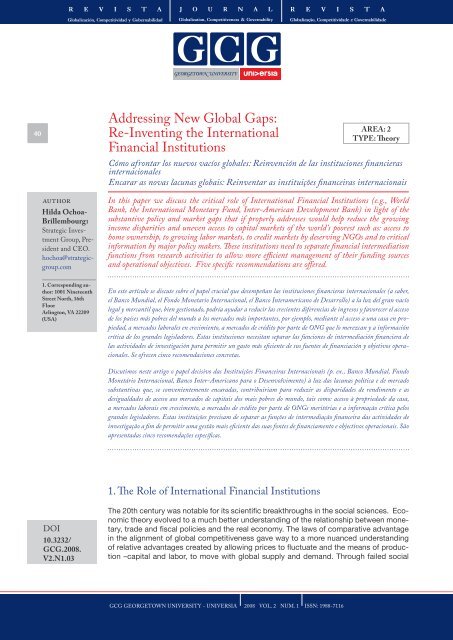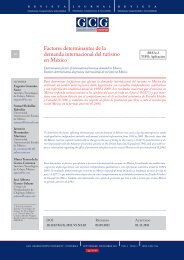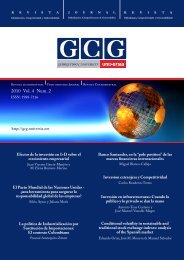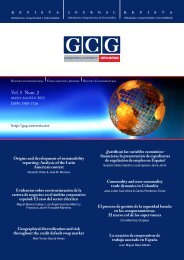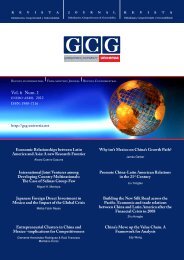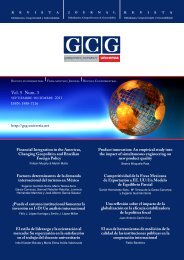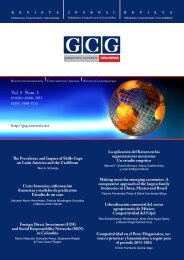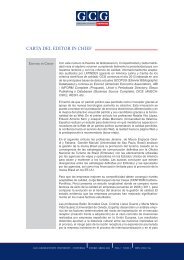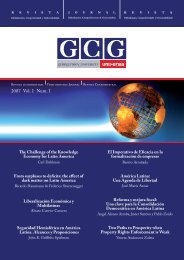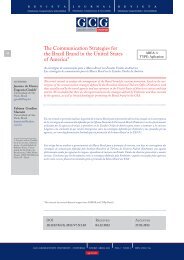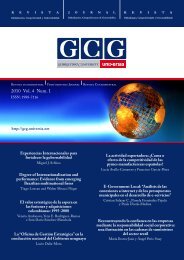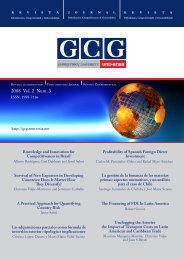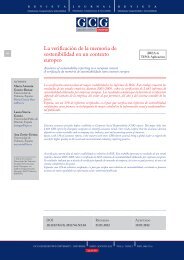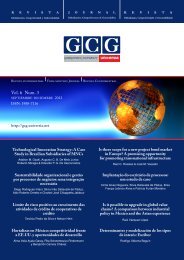40authorHilda Ochoa-Brillembourg1Strategic InvestmentGroup, Presi<strong>de</strong>ntand CEO.hochoa@strategicgroup.comAddressing New Global Gaps:Re-Inventing the InternationalFinancial InstitutionsAREA: 2TYPE: TheoryCómo afrontar los nuevos vacíos globales: Reinvención <strong>de</strong> las instituciones financierasinternacionalesEncarar as novas lacunas globais: Reinventar as instituições financeiras internacionaisIn this paper we discuss the critical role of International Financial Institutions (e.g., WorldBank, the International Monetary Fund, Inter-American Development Bank) in light of thesubstantive policy and market gaps that if properly addresses would help reduce the growingincome disparities and uneven access to capital markets of the world’s poorest such as: access tohome ownership, to growing labor markets, to credit markets by <strong>de</strong>serving NGOs and to criticalinformation by major policy makers. These institutions need to separate financial intermediationfunctions from research activities to allow more efficient management of their funding sourcesand operational objectives. Five specific recommendations are offered.1. Corresponding author:1001 NineteenthStreet North, 16thFloorArlington, VA 22209(USA)En este artículo se discute sobre el papel crucial que <strong>de</strong>sempeñan las instituciones financieras internacionales (a saber,el Banco Mundial, el Fondo Monetario Internacional, el Banco Interamericano <strong>de</strong> Desarrollo) a la luz <strong>de</strong>l gran vacíolegal y mercantil que, bien gestionado, podría ayudar a reducir las crecientes diferencias <strong>de</strong> ingresos y favorecer el acceso<strong>de</strong> los países más pobres <strong>de</strong>l mundo a los mercados más importantes, por ejemplo, mediante el acceso a una casa en propiedad,a mercados laborales en crecimiento, a mercados <strong>de</strong> crédito por parte <strong>de</strong> ONG que lo merezcan y a informacióncrítica <strong>de</strong> los gran<strong>de</strong>s legisladores. Estas instituciones necesitan separar las funciones <strong>de</strong> intermediación financiera <strong>de</strong>las activida<strong>de</strong>s <strong>de</strong> investigación para permitir un gasto más eficiente <strong>de</strong> sus fuentes <strong>de</strong> financiación y objetivos operacionales.Se ofrecen cinco recomendaciones concretas.Discutimos neste artigo o papel <strong>de</strong>cisivo das Instituições Financeiras Internacionais (p. ex., Banco Mundial, FundoMonetário Internacional, Banco Inter-Americano para o Desenvolvimento) à luz das lacunas política e <strong>de</strong> mercadosubstantivas que, se convenientemente encaradas, contribuiriam para reduzir as disparida<strong>de</strong>s <strong>de</strong> rendimento e as<strong>de</strong>sigualda<strong>de</strong>s <strong>de</strong> acesso aos mercados <strong>de</strong> capitais dos mais pobres do mundo, tais como: acesso à proprieda<strong>de</strong> da casa,a mercados laborais em crescimento, a mercados <strong>de</strong> crédito por parte <strong>de</strong> ONGs meritórias e a informação crítica pelosgran<strong>de</strong>s legisladores. Estas instituições precisam <strong>de</strong> separar as funções <strong>de</strong> intermediação financeira das activida<strong>de</strong>s <strong>de</strong>investigação a fim <strong>de</strong> permitir uma gestão mais eficiente das suas fontes <strong>de</strong> financiamento e objectivos operacionais. Sãoapresentadas cinco recomendações específicas.1. The Role of International Financial InstitutionsDOI10.3232/<strong>GCG</strong>.<strong>2008</strong>.V2.N1.03The 20th century was notable for its scientific breakthroughs in the social sciences. Economictheory evolved to a much better un<strong>de</strong>rstanding of the relationship between monetary,tra<strong>de</strong> and fiscal policies and the real economy. The laws of comparative advantagein the alignment of global competitiveness gave way to a more nuanced un<strong>de</strong>rstandingof relative advantages created by allowing prices to fluctuate and the means of production–capital and labor, to move with global supply and <strong>de</strong>mand. Through failed social<strong>GCG</strong> GEORGETOWN UNIVERSITY - UNIVERSIA <strong>2008</strong> VOL. 2 NUM. 1 ISSN: 1988-7116
experiments we quantified the <strong>de</strong>structive impact of regulation and price controls, andwe learned that global competition may be uncomfortable for those less able to adapt inthe short run, but in the long run we all benefit. We can now measure the fiscal divi<strong>de</strong>ndof higher, non-inflationary growth, and we have come a long way since Keynes focusedon fiscal policy as the most important tool in managing economic cycles. We learned toreach mo<strong>de</strong>rate levels of constructive policy consensus in a multi-polar world and tra<strong>de</strong>goods, services and capital with relative ease. We are now ready to tackle new challenges,but we need to build new hubs of research and thought lea<strong>de</strong>rship or re-tool theexisting ones to meet those challenges. Someone other than any one government has todirect the global chorus to sing in reasonable harmony.Un<strong>de</strong>niably world wealth has increased significantly over the last 20 years and the numberof poor, indigent people has <strong>de</strong>creased substantially with the <strong>de</strong>velopment of China,India, Brazil, and the former Socialist Republics along with most other emerging markets.But there are still significant knowledge and market gaps that need to be addressed. Inthe 20th century we saw the creation of international financial institutions (IFI), whosemission was to reduce the most critical market and knowledge gaps of the moment.After World War II, institutions like the World Bank Group, the International MonetaryFund and other multilateral regional banks were created to fill capital, tra<strong>de</strong> and creditmarket discontinuities exacerbated by the <strong>de</strong>structive consequences of WWII. In thepost-war period, member governments contributed significant funds to these institutionsto help jump-start the reconstruction of Europe and Japan. At the time, internationalcapital markets and commercial intermediaries were not sufficiently <strong>de</strong>veloped to clearthe counterparty risks associated with the reconstruction of a world <strong>de</strong>stroyed by war.When the rebuilding was un<strong>de</strong>r way, their mission appropriately shifted to extending creditto poor nations to help them overcome structural and cyclical gaps in their access tocapital markets and global tra<strong>de</strong>, foster economic growth and <strong>de</strong>crease poverty. In theprocess of channeling <strong>de</strong>velopment funds to emerging countries, accompanied by andoften attached to policy directives, these IFIs helped <strong>de</strong>sign and standardize nationalaccounting systems and measures of creditworthiness for all nations. With standardizedmeasurement of economic activity came improved fiscal, monetary and tra<strong>de</strong> policyadvice and management. The emerging theory of economic <strong>de</strong>velopment contributedthe concept of “shadow prices” to better measure the effect of infrastructure investmenton economic growth. Economic theory moved from the realm of political philosophy tothe field of quantitative monetary and fiscal science. With the ability to measure policyinitiatives, we could now manage toward specific economic growth targets. All of theseaccomplishments created the basis for sustainable economic growth around the world,not just based on the unachievable promises of politicians, but on measured, soundlytested analysis of policy reforms. The hub of the scientific evolution supporting policy reformsin these institutional intermediaries was at top universities and within the economicpolicy research <strong>de</strong>partments of newly created institutions, mostly the International MonetaryFund and the World Bank, as well as regional <strong>de</strong>velopment banks such as the InterAmerican Development Bank and the Asian Development Bank. This was a remarkableachievement in a mere 50 years. No previous scientific research focused on the socialsciences had achieved so much in alleviating world poverty in so little time.Today there are over 50 IFIs (over 80 including official export finance companies) withmore than $2.6 trillion in outstanding loans. However, <strong>de</strong>spite their large loan portfolios,41Key wordsInternationalFinancial Institutions,policy andmarket gaps, labormarkets, nationalaccountingstandards, fiscal/asset and liabilitymanagement,financial intermediation,mortgagesmarket, economic<strong>de</strong>velopmentPalabrasclaveInstitucionesfinancierasinternacionales,vacío político,mercados laborales,normas financierasnacionales, gestiónfiscal, <strong>de</strong> activos y <strong>de</strong>viabilidad, mercadohipotecario,<strong>de</strong>sarrolloeconómicoPalavraschaveInstituições FinanceirasInternacionais,lacunas políticase <strong>de</strong> mercado,mercados laborais,normas nacionais<strong>de</strong> contabilida<strong>de</strong>,gestão fiscal/activose passivos, intermediaçãofinanceira,mercado <strong>de</strong> hipotecas,<strong>de</strong>senvolvimentoeconómicoJEL Co<strong>de</strong>sG200; F330;O190<strong>GCG</strong> GEORGETOWN UNIVERSITY - UNIVERSIA <strong>2008</strong> VOL. 2 NUM. 1 ISSN: 1988-7116
- Page 1 and 2: Revista cuatrimestral Four-monthly
- Page 3 and 4: En el segundo artículo, Andrés Op
- Page 6 and 7: SUMARIO SUMMARY SUMÁRIO1ÚAmérica
- Page 8 and 9: StaffUniversity, EEUUEdwards, Sebas
- Page 10: StaffMario Cimoli, Technology and i
- Page 13 and 14: Libros: Dornier, P.P.; Ertns, R.; F
- Page 15 and 16: GCG- Each article will be submitted
- Page 17 and 18: GCGGCG GEORGETOWN UNIVERSITY - UNIV
- Page 19 and 20: 1. América Latina: la coyuntura ac
- Page 21 and 22: Bernardo Kosacoff y Andrés LopezAc
- Page 23 and 24: Bernardo Kosacoff y Andrés Lopezso
- Page 25 and 26: Bernardo Kosacoff y Andrés Lopez3.
- Page 27 and 28: Bernardo Kosacoff y Andrés Lopezva
- Page 29 and 30: Bernardo Kosacoff y Andrés Lopezaf
- Page 31 and 32: Bernardo Kosacoff y Andrés LopezBi
- Page 33 and 34: Bernardo Kosacoff y Andrés Lopez33
- Page 35 and 36: United States and Europe have becom
- Page 37 and 38: Andres Oppenheimer2,800, Chile 1570
- Page 39: Andres Oppenheimer39GCG GEORGETOWN
- Page 43 and 44: Hilda Ochoa-Brillembourgallow more
- Page 45 and 46: Hilda Ochoa-Brillembourg1.3. Help C
- Page 47 and 48: Hilda Ochoa-Brillembourg2. Why the
- Page 49 and 50: with a number of empires in other h
- Page 51 and 52: Josep M. Colomertial violence, forc
- Page 53 and 54: Josep M. ColomerIn contrast, ‘sta
- Page 55 and 56: Josep M. Colomeroverlapping institu
- Page 57 and 58: Josep M. ColomerReferences57Badie,
- Page 59 and 60: Josep M. Colomer59GCG GEORGETOWN UN
- Page 61 and 62: países con regimenes democráticos
- Page 63 and 64: Beatriz M. Ramacciottiel ámbito mu
- Page 65 and 66: Beatriz M. Ramacciottimiembro de lo
- Page 67 and 68: Beatriz M. RamacciottiEl nuevo esce
- Page 69 and 70: Beatriz M. RamacciottiComo dicen al
- Page 71 and 72: Beatriz M. Ramacciottiobservaciones
- Page 73 and 74: Beatriz M. Ramacciotti73GCG GEORGET
- Page 75 and 76: del entorno global (Prats i Catalá
- Page 77 and 78: Manuel F. Suarez-Barraza y Juan Ram
- Page 79 and 80: Manuel F. Suarez-Barraza y Juan Ram
- Page 81 and 82: Manuel F. Suarez-Barraza y Juan Ram
- Page 83 and 84: Manuel F. Suarez-Barraza y Juan Ram
- Page 85 and 86: Manuel F. Suarez-Barraza y Juan Ram
- Page 87 and 88: Manuel F. Suarez-Barraza y Juan Ram
- Page 89 and 90: de los países del mundo, utilizan
- Page 91 and 92:
Daniel Correa SabatPor su parte, y
- Page 93 and 94:
Daniel Correa SabatPara efectos de
- Page 95 and 96:
Daniel Correa Sabaten la contrataci
- Page 97 and 98:
Daniel Correa Sabaten definitiva, g
- Page 99 and 100:
Daniel Correa SabatReferencias99ANG
- Page 101 and 102:
filantropía a nivel local, son tod
- Page 103 and 104:
Francesco D. Sandulli3. Estrategias
- Page 105 and 106:
Francesco D. SandulliTabla 1: Medic
- Page 107 and 108:
Francesco D. SandulliTal y como se
- Page 109 and 110:
Francesco D. SandulliEn el segundo
- Page 111:
Francesco D. SandulliBibliografía1


